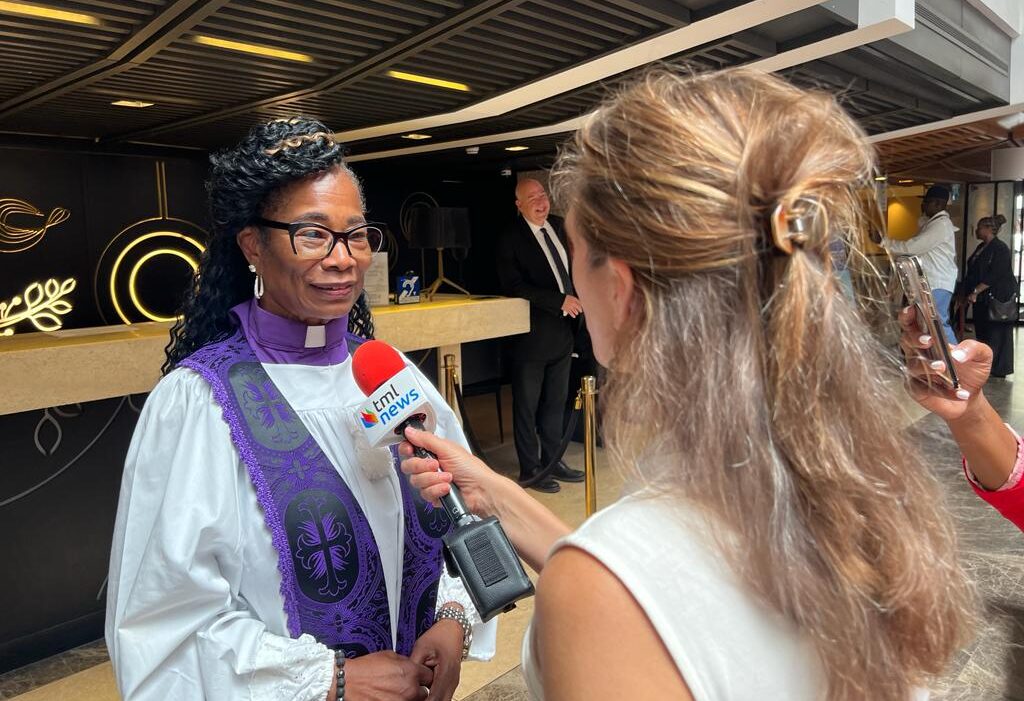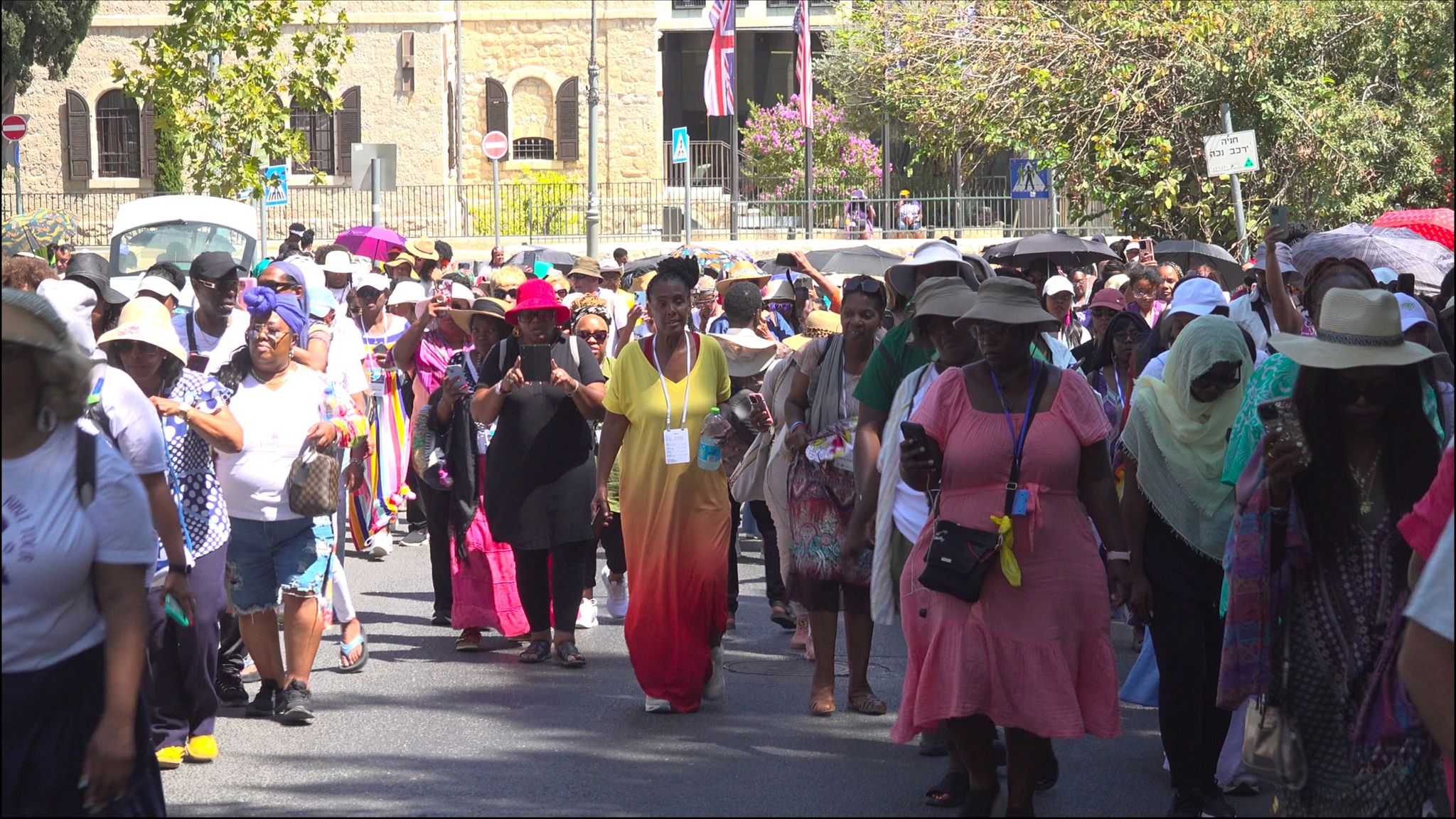Awakening Dormant Ties: African American Christians March in Jerusalem To Revive the Black-Jewish Alliance
African American tour groups walk down Jerusalem's Martin Luther King Street to fortify connections with Jews and Israel and promote a sense of shared historical struggle
[Jerusalem] More than 500 African American Christians marched on Jerusalem’s Martin Luther King Street last Wednesday to honor the civil rights leader and to further his mission of forging connections between Black America, Israel, and Jews.
Amid sweltering heat, participants sang hymns and gathered at Martin Luther King Plaza for a ceremony with Jerusalem’s deputy mayor, Fleur Hassan-Nahoum. Representing the Southern Christian Leadership Conference (SCLC)—the civil rights organization co-founded and led by King himself—the current CEO Dr. Charles Steele and his wife Cathelean Steele spoke at the march.
During the ceremony, Glenn Plummer, bishop of Israel for the Church of God in Christ (COGIC), played an audio clip of Dr. King’s last speech, delivered on April 3, 1968, in which he recounted his 1959 visit to Jerusalem and descending the steep, winding road down to Jericho. Though visiting the eastern, Jordanian-controlled side of the city and the West Bank, he never made it into Israel, despite plans to lead an interfaith pilgrimage there in November 1967.
Referring to this visit, King said he had “been to the mountaintop” but, like Moses, might not make it to the Promised Land.
He had been here, he and his wife, and he wanted us as a people to come here to the Promised Land. That’s what he was talking about when he said he had been to the ‘mountaintop.’
“He had been here, he and his wife, and he wanted us as a people to come here to the Promised Land. That’s what he was talking about when he said he had been to the ‘mountaintop,’” Plummer explained.
King “went on to say that he might not get there with us, but that we as a people will get to the Promised Land,” Plummer said that. “And here we are, having just walked down Martin Luther King Street in Jerusalem.”

(L-R) Glenn Plummer, bishop of Israel for the Church of God in Christ, and Dr. Ruth Pauline Plummer, CEO of Covenant Daughters, July 26, 2023, Jerusalem, Israel. (Nicole Jansezian/The Media Line)
We need to come together and have a meeting of the minds and strategize together and get a plan on how to solve these problems
Part of the reason ties with Israel never took off after King’s assassination was that after significant progress was made in protecting civil rights in America, many African Americans focused instead on their individual paths, Cathelean Steele said.
“We started looking at what we were achieving rather than looking at the big picture of what we could achieve and how we could continue the relationship with Israel,” Steele told The Media Line. “We need to come together and have a meeting of the minds and strategize together and get a plan on how to solve these problems.”
Give the gift of hope
We practice what we preach:
accurate, fearless journalism. But we can't do it alone.
- On the ground in Gaza, Syria, Israel, Egypt, Pakistan, and more
- Our program trained more than 100 journalists
- Calling out fake news and reporting real facts
- On the ground in Gaza, Syria, Israel, Egypt, Pakistan, and more
- Our program trained more than 100 journalists
- Calling out fake news and reporting real facts
Join us.
Support The Media Line. Save democracy.
The march was only one event in which two separate tour groups took part. One group comprised 150 Christian women leaders, mainly African Americans but also including a few participants from Turks and Caicos Islands and the Bahamas, on an educational tour. The other group comprised 400 Christians on pilgrimage to the Holy Land.
The event was organized by Bishop Plummer’s wife, Dr. Ruth Pauline Plummer, CEO of Covenant Daughters, a faith-based women’s organization.
The ceremony represented the culmination of her Women of the Bible Tour, which focused on connecting Christian female leaders to Israel and Israeli leaders. Participants met with Knesset Member Sharren Haskel, co-chair of the parliamentary Christian Allies Caucus, and were hosted by Israel’s first lady, Michal Herzog, during a 10-day educational tour.

Covenant Daughters CEO Dr. Ruth Pauline Plummer (L) and Israeli first lady Michal Herzog (C) at the President’s Residence in Jerusalem, July 25, 2023. (Felice Friedson/The Media Line)
Another of the tour’s aims was to revive and formalize relations between Israel and Black America, relations that could only be done with African American representation on the ground in Israel, Ruth Plummer said.
She said after she and her husband moved to Israel in 2020, they learned of King’s intentions and started bringing tours of African American leaders to the Holy Land including one in 2022 with 200 COGIC leaders. COGIC is the largest Pentecostal denomination in the US and has over 6.5 million members and 12,000 congregations globally.
“Once we began to find out about Dr. King’s vision, we were able to pick it up and bridge the gap,” she told The Media Line. “We hadn’t any representation here in terms of leadership, the mediators who could forge those relationships. Because Covenant Daughters is an affiliate of the SCLC, and because we better understand now the vision of Martin Luther King for Israel, we can move forward with building that relationship,” she said.
Addressing the group on Tuesday, Haskel noted that Blacks and Jews in America faced similar struggles in overcoming poverty and fighting for their rights. She believes that if the Knesset’s Christian Allies Caucus focuses on African Americans, it could be “an incredible platform” for both Blacks and Jews.

Member of Knesset Sharren Haskel, co-chair of the parliamentary Christian Allies Caucus, addresses the group, July 25, 2023. (Dario Sanchez/The Media Line)
“There is dramatic and terrible racism and hatred toward the African American communities and there’s also a lot of antisemitism and racism toward the Jewish community,” Haskel told The Media Line. The two groups have “different histories, different backgrounds, obviously,” she said. “But struggling together, rising up together, these stories explain why a lot of the Jews were the first ones to join the fight for freedom of those African American communities—and it is an incredible history.”
The director of the Christian Allies Caucus, Josh Reinstein, said the Black church is a “natural partner” for Israel.
“They read the Old Testament more than any other church, they understand the prophets, they understand why the Jewish people are back in their homeland,” he said in an interview with The Media Line. “So for us, it is important to develop these relationships, to build these ties and work even stronger together.”
In an interview with The Media Line, Archbishop Ruth W. Smith, co-founder of Light of the World Christian Tabernacle International, a Georgia-based church with 200,000 members worldwide, said Christians should cross the bridge to “come together with the Jewish people.” But she also invited Israelis to the US to understand the African American experience.

The Media Line’s Nicole Jansezian interviews Archbishop Ruth W. Smith, co-founder of Light of the World Christian Tabernacle International, in Jerusalem, July 25, 2023. (Felice Friedson/The Media Line)
Apostle Joshua Giles, founder of Kingdom Embassy Worship Center in Minneapolis, Minnesota, was leading a separate tour of Israel for 400 people and joined the march with his group. Giles, an evangelical Christian who promotes racial reconciliation, told The Media Line he had seen a groundswell of support for Israel among Black Americans.
“It’s almost like an awakening happening now where people are saying they feel drawn there and want to know the people, area, and culture,” he told The Media Line. “And one of the ways we can get the message out more is starting with people we know, telling our families, our communities and just spreading that positive message of this area and how it’s so central to our Christian faith. And once we do that, more and more people are going to feel they can come and be a part of what’s going on here.”
With organizations such as Black Lives Matter supporting pro-Palestinian causes, it is widely assumed that a majority of Black America is anti-Israel. But Ruth Plummer said it is disingenuous to believe that African Americans side with one side or the other.
“We want to dispel the myth that all Black Americans do not support Israel,” she told The Media Line. “In every group of people, there are those who hold their own opinions, but that is not the majority.”
She noted that 80% of Blacks identify as Christian, “and so, therefore, our foundation is the Bible.”
“We don’t support everything Israel does, but we believe in the God of Israel,” she said. “This tour and the march were primarily about our faith. That’s not a social issue and we aren’t going to make it one. We don’t know how King would determine the social justice issues here today, but he believed in Israel’s right to exist.”
After the march, Hassan-Nahoum noted that in the Torah portion read in synagogues that week, Moses implored God to let him enter the Promised Land, but God refused, telling him instead to ascend a mountain and view the land from the mountaintop.
“And that connects to Dr. Martin Luther King, who said you’re going to go to the Promised Land even though ‘I may not get there with you.’ And here we are in that same week. and all of you are here, being in the Promised Land without Dr Martin Luther King just like the Jewish people without the great Moses. And that, to me, is the most beautiful parallel of all,” she said.



